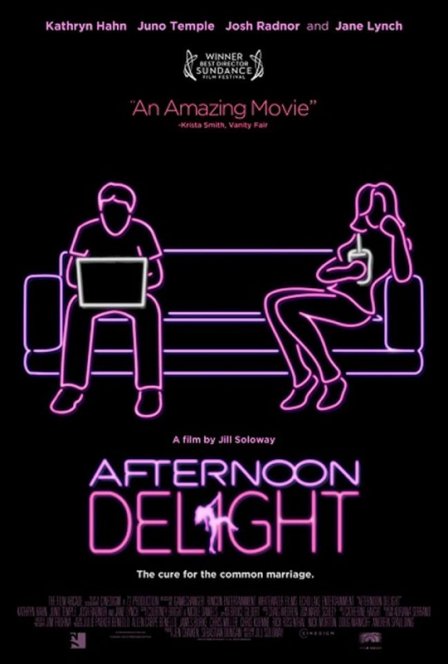Writer/producer Jill Soloway’s feature-length directorial debut is bothersome insofar as it purports to lay bare the foibles and self-pitying behavior of the upper middle class, all the while engaging in the same behavior itself. What begins as a thorough browbeating of vanilla sex lives, pre-school fundraising auctions, and well-heeled malaise ends up glorifying all of those things to a certain extent, leaving us to question why the film was even made in the first place. While the actors do their best to wring solid performances out of some woefully tepid and almost-of-the-moment source material, the need of the film’s writer/director to offer an apologia for bored, wealthy housewives hamstrings anything genuine or interesting.
Rachel (Kathryn Hahn) and her app-creating husband Jeff (Josh Radnor) are in the midst of a sexual dry spell when we meet the two of them. Rachel, who consistently recoils at Jeff’s late-night advances, finds any number of ways to explain away her total dearth of libido. If it isn’t because he wants to have sex too late in the day, it’s because of their young son, and so on and so forth. Laying all of this on her embarrassingly stereotypical therapist (Jane Lynch), the Rachel we’re presented with up front is someone annoyed at the small concerns of her stay-at-home mom cohort, fed up with helping plan school events and drinking zinfandels. Formerly a respected writer with a decent amount of promise, Rachel’s trapped by the conventions of both her marriage and her Jewish, upper middle class community in the super nice Silverlake neighborhood of Los Angeles. Drawing upon the experience of a friend whose paint-by-numbers sex life was reignited by a spontaneous foray to a strip club, Rachel convinces an at-first reticent Jeff to go ogle some women with her and another comparably wealthy urban couple.
As you might expect, something starts to stir within Rachel after getting a sultry and appropriately, profoundly red-lit lap dance from Juno Temple (McKenna). Finding herself drawn back again and again to the area surrounding the club McKenna dances at — which provides the occasion for some truly cringeworthy and recurring jokes about Twitter — Rachel eventually invites the young woman into her home as a live-in nanny for her young son. Oddly enough, Rachel seems totally into the whole sex-work thing that McKenna’s doing until the realization hits that a pretty central part of McKenna’s gig requires a coldly businesslike relationship to sexuality, which, Jesus, really?
If the goal half of the movie was to shore up a bulky reserve of sympathy for Rachel, which seems to be the case, then that reserve was pretty much exhausted when she makes a scene complaining about not having as many kids as her peers at a moms’ get-together/wine-party. It’s a bit hard to squirt some tears for someone who refuses to have sex with their partner and then drunkenly melts down about not getting pregnant. One is left to wonder if Rachel thought there was some kind of rich private school stork that just gave you a kid if you had two sets of china.
The second half of the film is pretty much dedicated to detailing the struggle and awkwardness of Rachel and Jeff’s slow return to a more robust (yet still somehow boringly predictable) sex life, with some dramatic stuff involving McKenna thrown into the mix to create a bit of tension. In the end, we see Rachel content to deal with her wealth and status on her own terms, having more sex with her long suffering husband, and, judging from a totally tacked-on Judaic religious sequence, more open to engaging with the spiritual. Soloway’s characters annoy because the writer/director makes it almost impossible to take them seriously. Rachel’s tragedy is largely manufactured by her own inability to grasp how ridiculous her problems are, while Jeff is barely allowed a context, much less an opportunity, to express any kind of meaning. We can wonder what might have happened if Soloway were more courageous in dealing with rogue sexuality, but, much like Afternoon Delight, that kind of wondering is ultimately pointless.

